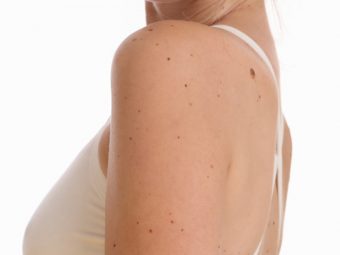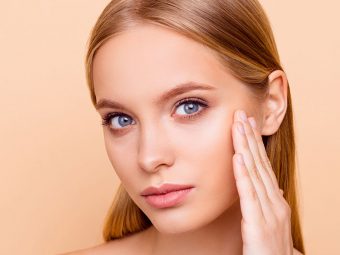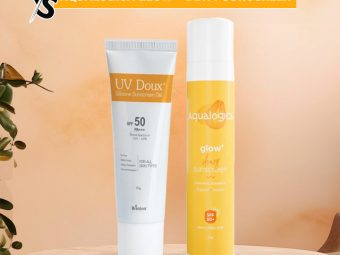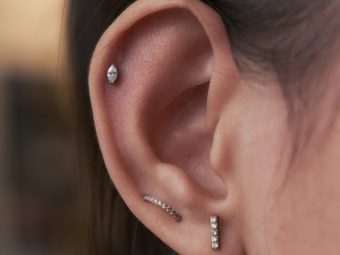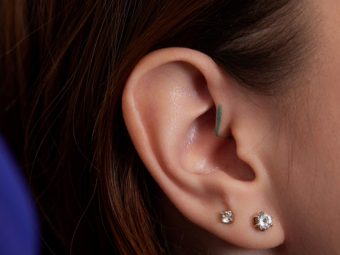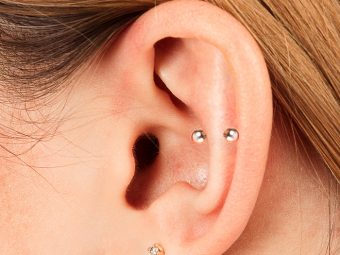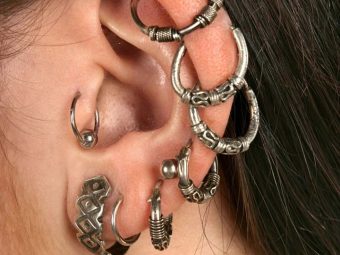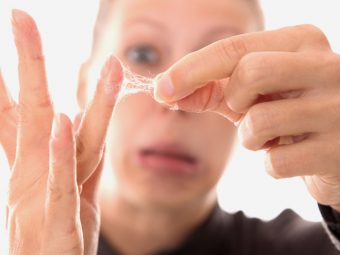Rosehip Oil For Acne: Benefits, How To Use, And Side Effects
Unveil flawless skin with rosehip oil’s acne-fighting power and transform your skin with its healing properties.
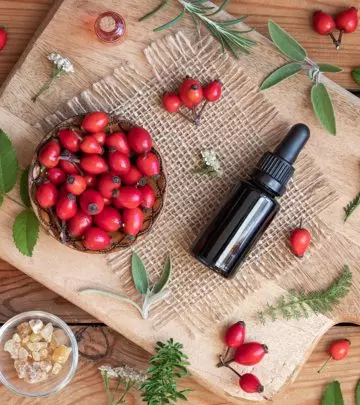
If you are looking for natural remedies for your acne, you have come to the right place. Using rosehip oil for acne is certainly a reliable home remedy, thanks to the essential nutrients it retains from the seeds and fruits of the rose plant. In this article, we take a deeper look at the benefits of using rosehip oil and a few tips to keep in mind before using it.
In This Article
What Is Rosehip Oil?
Rosehip oil or rosehip seed oil is extracted from the plants belonging to the Rosa (rose) species, especially Rosa canina and Rosa damascena. This oil is commonly used in folk medicine for its disease-preventing and therapeutic properties. Rosehips are used to manage issues like common cold, urinary tract infection, infections, and other inflammatory diseases. They contain the highest ascorbic acid levels (vitamin C) than any other fruits and vegetables (1). Rosehip seed oil can also help in acne management. Let’s find out how in the next section.
Kim, a blogger, shares her journey of overcoming the misconception that oily products are especially bad for acne-prone individuals, noting, “My body was trying to tell me it needed moisture, and if I wasn’t going to listen to what my body was saying, it would try and compensate on its own… but in these kinds of situations, the body often overcompensates, leaving the skin too oily and thus very prone to clogged pores and breakouts.” She discusses her experience with rosehip oil and how it transformed her skincare routine, stating, “I’m also beginning to notice my makeup application is getting easier each day I use it. After about six weeks, my skin tone is becoming visibly more even. I was even complimented on how great my makeup looked two weeks into starting use… but I didn’t apply it any differently than I normally do. My skin just looks better (i)!”
Rosehip Oil For Acne: How It May Help
1. Regulates Sebum Production
Excess sebum secretion may clog the skin pores and trap acne-causing bacteria, resulting in inflammatory papules. The rosehip seed oil contains linoleic acid, which regulates sebum secretion and maintains the natural oil balance (2). This can reduce inflammation and calm the acne lesions.
Low linoleic acid levels affect the skin barrier and trigger acne and breakouts. The rosehip seed oil contains 40%-56% linoleic acid that helps maintain healthy skin and prevent acne (3).
2. Antimicrobial Properties
Rosehip seed oil has antimicrobial properties and is effective against S. aureus, the acne-causing bacteria (4). It may help minimize acne inflammation and prevent spots and scarring.
3. Anti-Inflammatory Properties
Acne flare-ups are often caused or aggravated by inflammation. Rosehip seed oil has anti-inflammatory properties due to the high levels of phenolic acids, tocopherols, and carotenoids. These antioxidants protect your skin from oxidative stress and minimize inflammation (5). They can also soothe acne lesions and redness.
4. Promotes Wound Healing
Acne flare-ups may form lesions and leave visible scars. Rosehip oil can heal wounds and improve the appearance of scars (6). This reduces the chances of developing acne spots and marks.
If you have hormonal and cystic acne, it is always recommended to visit a dermatologist and not experiment with home remedies. However, if you get occasional breakouts and minor papules and pustules and prefer home remedies, you may use rosehip seed oil. You may also use rosehip seed oil as a preventive measure.
How To Use Rosehip Oil For Acne
Rosehip seed oil is a carrier oil, so you can apply it directly to the affected area. However, ensure you are using 100% pure rosehip seed oil for therapeutic effects.
To use rosehip seed oil:
- Rub 2-3 drops of the oil between your palms.
- Massage the affected area in circular motions.
To use rosehip seed oil as a spot treatment:
- Dab the oil only on acne spots using a Q tip.
- Leave it on overnight and wash it off the next day.
For best results, use the oil twice daily once in the morning and once at night. You may mix 2-3 drops of the oil with your regular moisturizers, face masks, or creams and apply for extra nourishment.
 Quick tip
Quick tipRosehip seed oil is useful in maintaining overall skin health and has anti-aging benefits. In the next section, let’s explore the other skin benefits of the oil.
Other Skin Benefits Of Rosehip Oil
- UV Protection: Rosehip contains phenolic compounds and a high concentration of ascorbic acid. These phenolic compounds reduce oxidative stress triggered by UV exposure and protect the skin from photodamage. It has carotenoids (provitamin A), and vitamins E and C (3). These vitamins are free radical scavengers that can keep your skin healthy and prevent spots and pigmentation.
- Anti-Aging Benefits: Rosehip powder and extracts (including oil) can minimize wrinkles, reduce the depth of crow’s feet, and improve the skins moisture content and elasticity to keep it plump and youthful(3).
 Trivia
Trivia- Skin Disorders: Topical rosehip seed oil can help manage conditions like dermatitis, eczema, and other inflammatory dermatoses like pruritis and erythema (5). Animal studies found that extract of Rosa canina rosehips could inhibit B16 melanoma cells that cause melanoma or skin cancer (3).
Rosehip oil is considered safe and often used in cosmetic products. However, it may cause side effects if you are allergic to it.
Side Effects Of Rosehip Oil
Rosehip seed oil may cause allergic reactions like:
- Redness
- Rashes
- Hives
- Wheezing
- Itchy and watery eyes
- Dizziness
- Breathlessness
- Itching
Therefore, always perform a patch test before using the oil. If you experience any side effects, discontinue using the oil and consult a dermatologist. Here are some safety tips to consider when using rosehip oil.
Safety Precautions To Follow When Using Rosehip Oil
- Rosehip oil may cause sun sensitivity as it contains carotenoids (provitamin A). After applying the oil, stay indoors for an hour or more before stepping out.
- Excess rosehip seed oil may clog the skin pores and cause buildup. Hence, apply only a few drops of the oil.
- If you have sensitive skin, perform a patch test to prevent any allergic reactions.
- Do not pair rosehip seed oil with any other retinoids as it may cause severe reactions.
- If you do not like the smell of rosehip oil, mix it with essential oils and use it.
Acne can be treated using rosehip oil. It keeps your skin healthy by reducing inflammation, preventing extra sebum production, and reducing oxidative damage. In addition, it can help enhance the elasticity of the skin and collagen production when used as a home treatment. However, please conduct a patch test before using rosehip seed oil because it has the potential to induce allergic responses. If you have any negative reactions to the oil, stop using it and consult a dermatologist. When using rosehip oil, remember to follow the safety precautions. However, if you have cystic or hormonal acne, you should always see a dermatologist for effective treatment.
Frequently Asked Questions
Is rosehip oil good for dry skin?
Yes, rosehip oil is good for dry skin and keeps it moisturized.
Will rosehip oil clog pores?
Excessive usage of rosehip oil may clog the skin pores.
Can rosehip oil remove fine lines and wrinkles?
Rosehip oil can improve the appearance of fine lines, wrinkles, and crow’s feet.
Can rosehip oil help rosacea?
Rosehip oil can be used for managing inflammatory skin conditions like rosacea. However, consult your doctor before using it.
Wondering if rosehip oil can combat acne and fade acne scars? Extracted from rose seeds, this essential oil is packed with skin-loving vitamins and essential fatty acids. Check the video to make the most of this naturally-nourishing remedy.
Personal Experience: Source
StyleCraze's articles are interwoven with authentic personal narratives that provide depth and resonance to our content. Below are the sources of the personal accounts referenced in this article.
(i) Let’s talk about rosehip oilhttps://kcincleveland.wordpress.com/2015/05/19/lets-talk-about-rosehip-oil/
References
Articles on StyleCraze are backed by verified information from peer-reviewed and academic research papers, reputed organizations, research institutions, and medical associations to ensure accuracy and relevance. Read our editorial policy to learn more.
- Characterization of Rosehip (Rosa canina L.) Seed and Seed Oil
https://www.tandfonline.com/doi/full/10.1080/10942912.2013.777075 - Safety and efficacy of two botanical based topical anti-acne products in treatment of mild to moderate acne subjects
https://medcraveonline.com/JDC/JDC-04-00161.pdf - Therapeutic Applications of Rose Hips from Different Rosa Species
https://www.ncbi.nlm.nih.gov/pmc/articles/PMC5485961/ - Note: Antioxidant and Antibacterial Activities of Rosa Damascena Flower Extracts
https://journals.sagepub.com/doi/10.1177/1082013204045882 - Anti-Inflammatory and Skin Barrier Repair Effects of Topical Application of Some Plant Oils
https://www.ncbi.nlm.nih.gov/pmc/articles/PMC5796020/ - Rosehip Oil Promotes Excisional Wound Healing by Accelerating the Phenotypic Transition of Macrophages
https://www.thieme-connect.com/products/ejournals/abstract/10.1055/a-0725-8456








